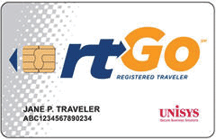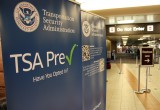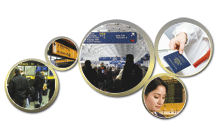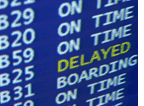Registered Traveler cards take flight at Reno Tahoe International Airport
21 June, 2007
category: Biometrics, Government
 Travelers at the Reno-Tahoe airport can now opt for speedier passage through security with the new Registered Traveler Card called rtGO. To get the card, biometrics are enrolled and a $100 annual fee is required. Pending successful background screening, the new smart card (manufactured by Gemalto) is issued and is ready for use in Reno, Cincinnati, Indianapolis, New York (JFK), Orlando, and San Jose. Interoperability requirements established by the TSA ensure that cards issued by Unisys or other RT vendors can be used at all participating airports.
Travelers at the Reno-Tahoe airport can now opt for speedier passage through security with the new Registered Traveler Card called rtGO. To get the card, biometrics are enrolled and a $100 annual fee is required. Pending successful background screening, the new smart card (manufactured by Gemalto) is issued and is ready for use in Reno, Cincinnati, Indianapolis, New York (JFK), Orlando, and San Jose. Interoperability requirements established by the TSA ensure that cards issued by Unisys or other RT vendors can be used at all participating airports.
Unisys Opens Registered Traveler Program at Reno-Tahoe International Airport
rtGOSM members’ cards will work at any participating Registered Traveler airport
BLUE BELL, Pa., June 21, 2007 – Unisys Corporation (NYSE: UIS) announced today that its Registered Traveler program, rtGOSM, is open at Reno-Tahoe International Airport. Registration began in May and members have begun receiving their rtGOSM cards, which they will use at specially designated security lanes to verify their identity and pass through airport security quicker and more efficiently.
Registered Traveler, which began as a Transportation Security Administration (TSA) pilot program in the summer of 2004, permits frequent fliers to obtain a biometric credential – a unique identifier, such as a fingerprint or iris scan – that enables them to navigate airport security checkpoints more efficiently without compromising the security standards TSA has implemented. Unisys, which has nearly 20 years’ experience integrating biometric technologies that verify an individual’s identity, ran three of TSA’s five pilot programs. For more information, visit www.rtgocard.com.
rtGOSM and interoperability
In accordance with parameters that industry and government established, Unisys rtGO card is interoperable, meaning that any rtGO member can use his or her card at any airport with a Registered Traveler program, regardless of whether Unisys or another vendor operates the program.
“We are delighted to welcome Reno-Tahoe travelers to the rtGO program,” said Bryan Ichikawa, Registered Traveler program director, Unisys. “We want rtGO members to know that we are continually evaluating additional benefits to add to the program – including technologies that can further speed the security process and reciprocal relationships with travel-related vendors who might provide incentives to members.”
Sign up for secure rtGOSM card
The rtGOSM registration office at the Reno airport is located near carousel four at the baggage claim. Registrants provide some basic identifying information and also have their finger prints and iris scanned. TSA then conducts a background check and, once customers are approved, they will receive their official rtGO card. The card contains only a template of the biometric information; therefore, it cannot be compromised or used to verify the identity of anyone other than the rtGO member. Verification at the security lane kiosk takes just a few seconds.
“Unisys and the rtGOSM program have been outstanding partners for the Reno-Tahoe Airport Authority,” Krys Bart, A.A.E., executive director and chief executive officer of the Reno-Tahoe Airport Authority, said.
“They have provided our airport and community with a highly professional staff that demonstrates a strong understanding of the unique customer service that is required in today’s airport environment.”
Research supports biometrics, RT program
Recent Unisys research found that almost two thirds (62 percent) of respondents in a U.S. survey of more than 1,700 consumers said a program like RT would increase their trust in airport security. The Ponemon Institute conducted the research as part of the Unisys Trusted Enterprise study, a broader multi-year, global initiative that examines trust, security and related issues.¹
The research also revealed that biometrics are among the top technologies that consumers believe will have the greatest impact on strengthening airport security. More than half (51 percent) feel that technology plays a significant role in ensuring homeland security, and point to biometrics as one of the best ways to improve protection, after physical security.
¹ The research is part of a broader multi-year, global Unisys Trusted Enterprise study that examines trust, security and related issues. The initiative includes data on consumer and business sentiments to provide comprehensive tools for companies and governments to better redefine their own security and business processes for greater impact and visibility into the cause and effect relationships between business and technology goals and how they serve customers. The research was conducted on behalf of Unisys by the Ponemon Institute. The Ponemon Institute polled 1,744 respondents from a sampling frame of close to 16,000 consumers in the United States and coordinated with Ipsos/MORI in the United Kingdom, which polled 500 U.K. consumers in the November 2006. Consumers ranged in age from 18 to 75 with reported household incomes ranging from less than $20,000 to more than $201,000 per annum. Surveys were conducted online.
About Unisys
Unisys is a worldwide technology services and solutions company. Our consultants apply Unisys expertise in consulting, systems integration, outsourcing, infrastructure, and server technology to help our clients achieve secure business operations. We build more secure organizations by creating visibility into clients’ business operations. Leveraging the Unisys 3D Visible Enterprise approach, we make visible the impact of their decisions – ahead of investments, opportunities and risks. For more information, visit www.unisys.com.




